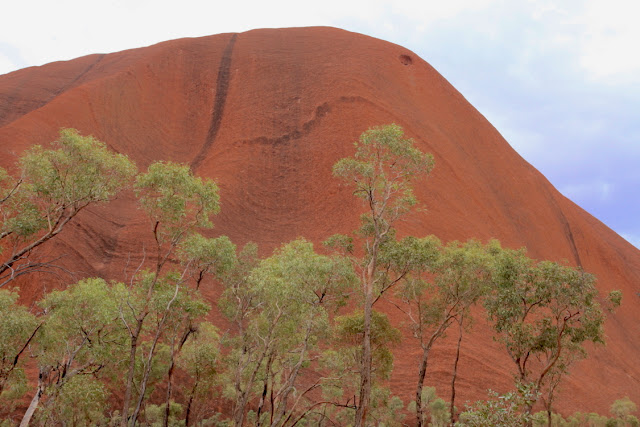After a few days in Alice Springs, it was time to head southwest to the main attraction of this region, Ayer's Rock, also known by its Aboriginal name Uluru.
The distances are long in the outback and I took this picture at the highway junction in Erldunda. Distances shown are in kilometers and this is half way to the rock from Alice.
Connor Butte as seen from a scenic overlook along the way. It is composed of Paleozoic sedimentary rocks.
Lake Amadeus is one of the many dry lakes located in central Australia
Our first view of Ayers Rock from the Yulara Resort. This would be the sunniest view of it during our stay, as wet and thundery weather moved in.
Dramatic skies frame the eastern side of the rock
The grass is called spinifix and it is very tough and drought resistant species
The rock is composed of a coarse sandstone called the Mutitjulu Arkose (arkose is a term used for sandstones that have a lot of feldspar mineral included - a feature that distinguishes arkose as having been deposited relatively close to the source area).
Eucalyptus trees frame the rock. Note the desert tapestry streaming down from the top, formed where water allows bacteria and lichens to grow.
On to the waterhole
Rock art in one of the overhangs near the waterhole. Aboriginal culture extends back more than 40,000 years in Australia and recent DNA testing shows that the line is most closely related to people now living in Sri Lanka.
Graceful canyon cut into the Mutitjulu Arkose
The rock is part of an upturned package of sandstone deposited about 550 Ma. That means it was laid down within about 9 million years of the Precambrian/Cambrian boundary. No land plants or animals existed when this sandstone was laid down.
This is the northwest side of the rock and we walked to the amphitheater seen where the long desert tapestry come down the cleft.
A closer view with gum trees in the foreground
This is a special spot
Looking up through the trees at the edge of the monolith
Rock and trees
Around the base of the rock are numerous cavities called tafoni. They are formed when water in the soil seeps into the rock, helping to dissolve the cement around the sand grains. This weakens the sandstone here and a cavity is formed, The dissolved cement is then transported by the same water to nearby where it precipitates causing the nearby sandstone to become extra hardened, That is how the roof pendants are formed.
Champagne and h'ors douves at the Ayers Rock
Group photo at sunset
At 6:01 the sun set but it was nowhere to be seen
Sunrise at Ayers Rock. Many people turned out even though it was raining at 5 AM.
This was about as good a shot as I could get. It was very dark and cloudy.
After breakfast we went west to see the Olga Mountains (or Kata Tjuta in the local Aborigine language). These rocks are the same age as those in Ayers Rock but as you will see are composed of something different.
Walking up into a gorge cut between one of the 18 domes of rock
Yep. This is a very coarse-grained conglomerate with clasts of crystalline gneiss and granite. Look at the size of those clasts! The interpretation is that this and the arkose at Ayers Rock were derived from the Petermann Mountains just a few miles west of here in latest Proterozoic time. At the Olga's, the streams delivered bouldery sediment whilst at Ayers Rock it was coarse sand. Two co-eval alluvial deposits from an ancient mountain range.
Tafoni and desert tapestries in the walls of the gorge
Three of the domes at the Olga's
The wind blown sand here is extremely red - more red than that seen in Arizona, which is more orange. In spite of the cloudy weather, this was a great visit and I was more impressed with "the rock" than I thought I would be. Still it is a small feature compared to all that we have in the American Southwest but Australia's Red Center is a unique and intriguing place.
A first view of Sydney, Australia. Watch for my next posting from Sydney soon.































No comments:
Post a Comment
If your comment will not post, email me with the problem.